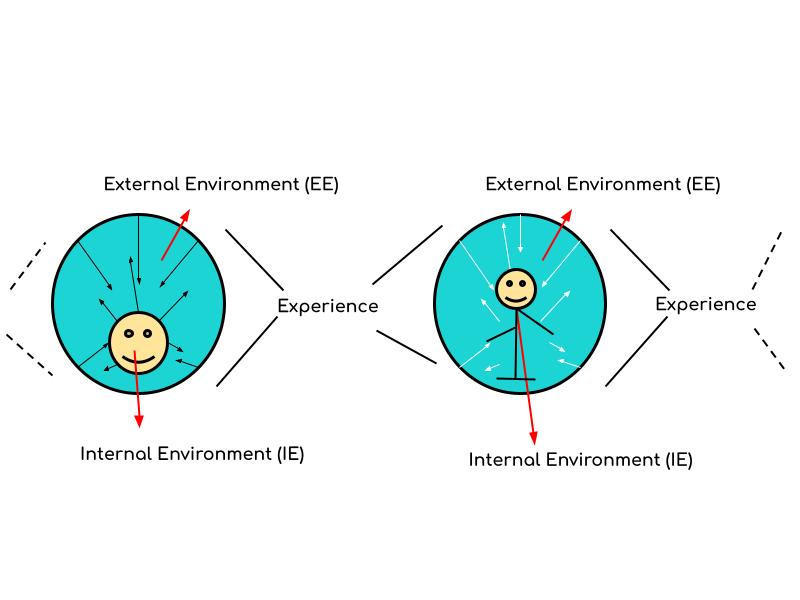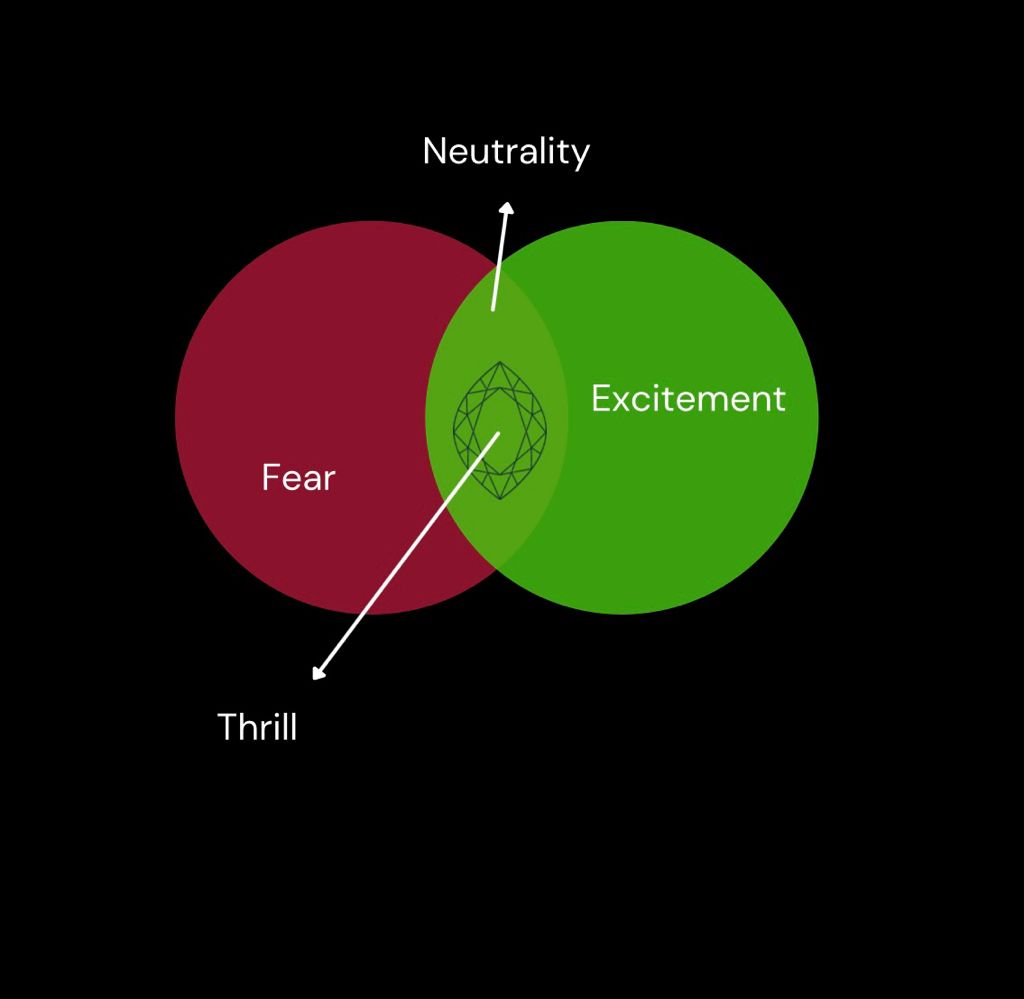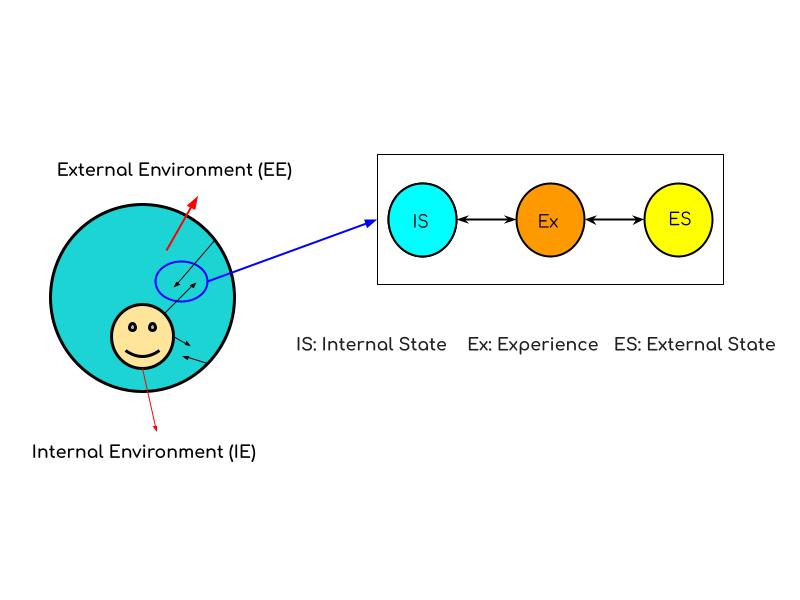The Tango Between Our Internal and External Environment
Publish date: 2021-07-04Life is an experiential process and no two people experience it the same way. But one thing we have in common is that our internal and external environments continuously interact with one another as we create experiences. In other words, an experience is the outcome of this interaction and is influenced by the state of your internal and external environment.
It is equally important to recognize that an experience itself is a separate entity from these states. Meaning that the outcome can very well impact the state of your internal and/or external environment. So while you are the creator of these experiences, you are also their outgrowth.

Before discussing further, I find it necessary to cover some terms that are used throughout this post.
For the sake of simplicity, I will abbreviate “Internal Environment ” to IE, “External Environment” to EE, “Internal State” to IS, and “External State” to ES.
The EE signifies all the elements that are outside of you and that you directly or indirectly interact with i.e., your external existence, other people, situations, information, concepts such as time, space, and objects. However, here, the EE represents another person.
The IE on the other hand refers to your internal existence, your processing of stimulus information, and the emotional state that results from it. Consider the IE a container that holds everything a person has gathered throughout their life i.e. unconscious or conscious beliefs, values, triggers, and a list of dos and don’ts. The IE is the source of all behavioral patterns.
A state refers to the condition of the IE and EE at any given time or moment in terms of emotions. There are three primary emotional states: excitement, neutrality, and fear. Each of these primary states creates a range of secondary emotions that vary in level and degree.
An experience is an emotionally charged event.

Look at it as a dynamic, massively interconnected system that follows the law of cause and effect. A system made up of billions and trillions of experiences.
On the one hand, you are influenced by your previous experience and affected by the result of your next experience, and on the other hand, you have affected your previous experience and will be impacting your next experiences.
Your IE is the result of your previous experiences and impacts your life trajectory. And your current internal state is impacting your next experience. This is because our emotional state at any given moment impacts the filters through which we perceive ourselves and interpret the world around us. As a result, subsequent responses manifest in the form of choice, attitude, decision, behavior, action, language, and conclusion, which in turn impacts your EE, the experience, and so on. The same goes for your EE.
Adopting this perspective not only allows you to go beyond the surface and see the existing underlying patterns and structures behind our experiences but also helps you to raise your consciousness.

External Environment and Our Internal State
The image above displays the connection between the experience, our IS, and the state of our EE. Subsequently, the slightest change in any of these elements can impact each element separately and as a whole.
Think back to a time when you took time off from work for a doctor’s appointment and arrived on time only to be told by the nurse that the doctor was running late and they would have to push back your appointment by an hour. Or that time when an argument at home impacted your day out with friends, or when you had plans after work but an unexpected task at work forced you to cancel your plans. In each of these scenarios, what happened in one part of your life impacted your mood and your state of mind.
Now let’s go beyond immediate experiences and take a look at your past. Think about a previous serious relationship that for whatever reason came to an end. Do you find yourself immediately looking for any resemblance between the new date and your previous partner every time you go on a date now? Are you trying to make sure your new love interests do not possess any of the qualities your previous partner had that you did not appreciate?
Acknowledging the Impact of the Past
Let's start from the beginning, from our first experiences in life.
As babies, we enter the world with a natural curiosity to connect, learn, and make sense of ourselves and our surroundings. We do that through our senses. With the help of our sensory organs and sensory nervous system, we capture signals, also known as sensory information, from our surroundings. These signals are then transmitted to different parts of the brain to help us gradually understand the state of our IE and construct a perception of the EE. The range of stimuli provided in this period helps us draw clearer pictures of the world around us. In short, our dominant perceptual thinking pattern- meaning the way we learn to collect, organize, and interpret what we sense- is influenced by the range of stimuli we are exposed to in the first year. In addition, the intensity and repetition of sensory input (sight, smell, hearing, taste, and touch) determine which one of these sensory channels becomes most accessible in our awareness and which one becomes less accessible. This all impacts our personality, learning style, love language development, vulnerabilities, strengths, etc.
How we experience the world in our involuntary early life experiences and voluntary experiences before the age of 7, which is the imprinting phase, lays the foundation for our physical, social, cognitive, and emotional development, and sets the stage for our experiences later on in life. For instance, our approach to relationships, our behavior when in a relationship, and our beliefs about how relationships should and shouldn’t be are based on a blueprint that we captured in our beyond conscious mind based on the responses that we received from our caregivers and from watching the people around us exchange love and affection.
With this in mind, it is easier to understand how the health of our IE and the EE contributes to the quality of our experience and vice versa.
Ideally, when a child’s emotional world is nourished properly, they can create or be open to enter experiences from a secure place. They also develop the ability to manage their emotions, feel safe to express and communicate their needs and requests appropriately. But that’s not the case for many.
Everyone has faced some sort of painful experience(s) in their life. Painful experiences, to varying degrees, cause emotional injuries that imprint on the psyche and alter one’s perception of reality.
But does this mean your future has to be dictated by the past?
Although it all starts with the environment, you have the choice to look at all your experiences through a different lens and learn from them.
Regardless of the kind of environment you were born into and raised in, the responsibility is on no one but you to work on improving the quality of your experiences. When you take responsibility for your current state, you realize that in every given moment you do have a choice and that you can make a deliberate decision to stay in the present and move towards the future.
Final thoughts
- If you don't train your emotions, the information you receive through your internal and external senses can be easily interpreted as a threat rather than an opportunity and vice versa.
- Our ability to process the full spectrum of emotions determines the health of our emotional world.
- Our ability to use emotionally expressive language to communicate our feelings determines our mental health and impacts our social world.
Share with me your thoughts, feedback or questions here.
I do group coaching as well as one-on-one sessions. You can learn more about coaching sessions with IVY here.